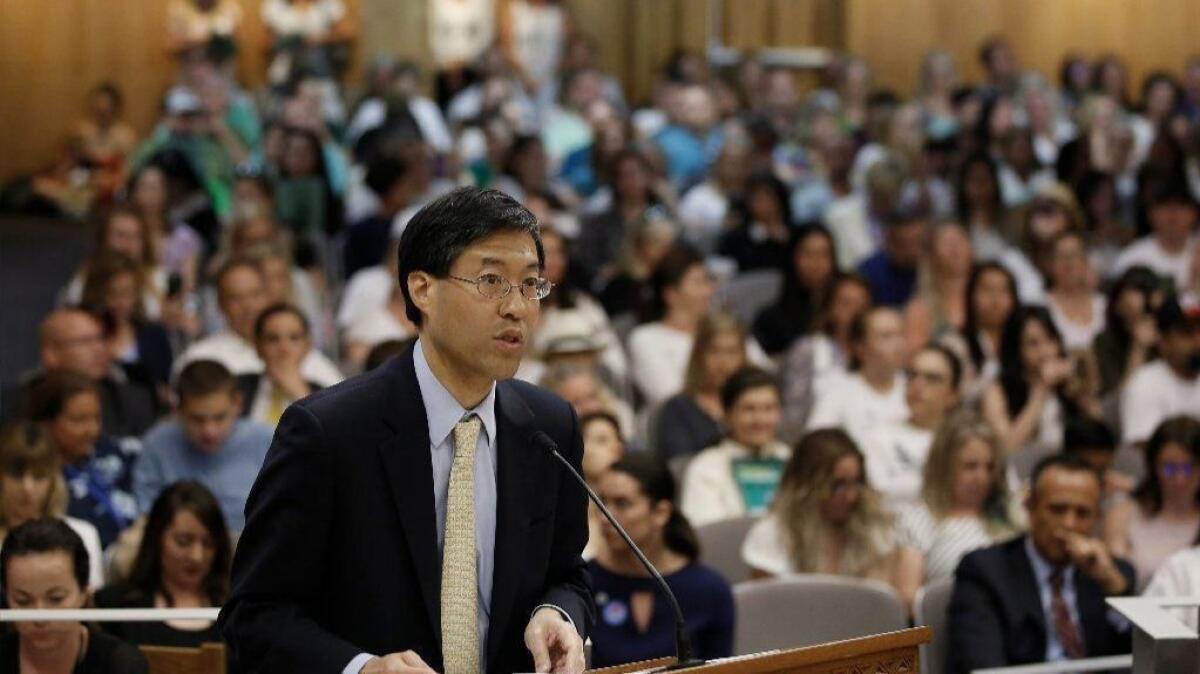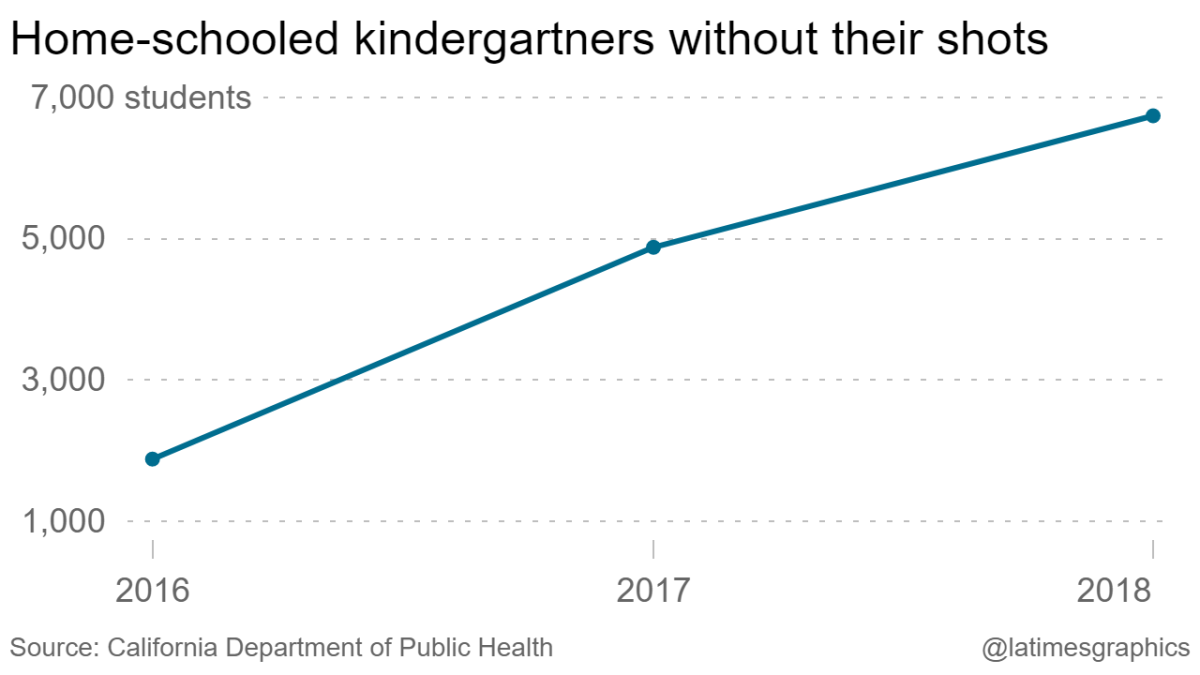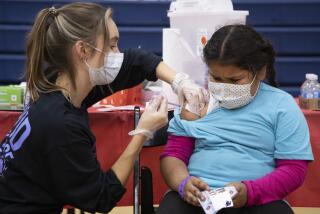Parents who won’t vaccinate their kids turning to home-schooling in California, data show

If Kardie Lee’s daughter had to be fully vaccinated to enroll in school, the choice was simple, she felt: Her daughter would not attend school.
Three years ago, Lee decided to home-school her daughter London, now 7, instead of complying with the state’s vaccination laws.
“We became a state where they force vaccination, and I was totally against vaccination,” said Lee, 34, who lives in Murrieta.
In 2016, California implemented one of the strictest immunization laws in the country, requiring that all children be up to date on their vaccinations to attend school unless a doctor says otherwise.

The law, however, does not apply to children who are home-schooled, a loophole that parents seem to be increasingly exploiting. Over the past three years, the number of kindergartners who were home-schooled and did not have their shots quadrupled, according to a Times analysis of state data.
It is unclear whether parents are opting for home-schooling solely because they want to avoid vaccines, or if they are choosing to home-school for other reasons and also happen to not want to vaccinate their children.
Regardless, there are now thousands of home-schooled children all over the state who do not have their shots — a number that keeps rising every year.
And though most of their schooling may take place at home, many are part of programs that meet several times a week with other students. If one contracted a disease such as measles, they could still spread it at the park, or the grocery store, or anywhere they come into contact with other people, said Dr. James Cherry, a UCLA expert on pediatric infectious diseases.
“They frequently get together,” he said. “If there’s a cluster, and they’re getting together, and [a disease] gets introduced, then there are going to be a lot of cases — and that’s likely to happen.”
California passed its strict vaccination law in 2015 following a major measles outbreak centered around Disneyland that scientists say was fueled by rising numbers of unvaccinated kids in the state.
Prior to the law’s implementation, parents could fill out a form saying that immunizations violated their personal beliefs and avoid vaccinating their kids. Now, parents must get a doctor’s note saying they have a medical reason not to be vaccinated.
California is one of only three states that does not allow parents to opt out of vaccines due to their beliefs.
Public health advocates have lauded the law’s success. In the first year the law was in place, the state’s kindergarten vaccination rate shot up above 95% for the first time in a decade.
But the law’s implementation has also coincided with an increase in parents choosing to home-school their kids — and not vaccinating them.
In the school year that ended in June, there were 6,741 home-schooled kindergartners without their shots in California, compared with 1,880 in the 2016-17 school year, according to state data. Overall, 1.2% of the state’s kindergartners were home-schooled and unvaccinated in the last school year, according to state data. (The state health department collects vaccination data only on kindergartners and seventh graders.)
Lee opted for home schooling because of an experience with her older child a decade ago. Her son, who is now 14, woke up in the middle of the night screaming after getting several shots at the doctor’s office. She found him gasping for air, his body stiff.
Though her son did not suffer any long-term consequences, the experience scared her. Lee doesn’t want to give London the required vaccines to attend school, she said.
“I think she would need 15 shots to start school, and I’m just not willing to do that at one time,” she said.
Nationally, the number of home-schooled students has been increasing for years. Between 1999 and 2012, the number of home-schooled children in the U.S. increased from 850,000 to 1.8 million, essentially doubling the number of home-schooled kids nationwide, according to a 2017 report from the U.S. Department of Education.
Advocates of California’s vaccination law say the trend is not driven by parents trying to avoid vaccination.
“We know home-schooling is increasing across the country,” said Sen. Richard Pan (D-Sacramento), who wrote SB 277. “We haven’t passed vaccination laws across the country.”
Monique Labarre, who runs a Facebook group for home-schooling families in San Diego, said that most parents are primarily concerned with academic standards, often for their children who are gifted or have special needs.
“The majority of people who we home-school with did not come into it because of SB 277 at all,” said Labarre, who home-schools her two sons.
But avoiding vaccination does seem to be on the mind of many home-schooling parents.
A popular new option for parents looking to home-school are home-school charters — public schools in which parents can enroll their children to receive guidance, state money for supplies and extracurricular activities, and then teach their kids at home.
At one of these home-school charter systems called IEM Schools, parents fill out a survey on what led them to their choice, said Cynthia Rachel, administrator of educational support. There are three IEM Schools in California that together serve more than 6,000 students.
Parents’ top reasons for choosing home schooling are required immunizations, along with concerns about school safety and social issues such as cyberbullying, she said.
“When SB 277 was passed, independent study programs with no classroom-based instruction were the only option for a student to attend public education in California if they did not have every required vaccination,” Rachel said. “We know now that the population that’s moving into independent study, many of them are doing it because they have no choice.”
The kindergarten vaccination rate at the three IEM schools ranges from 29% to 40%.
Several other home-school charters have popped up in recent years. At many, fewer than 25% of kids have all of their shots, suggesting that pro-vaccine parents are a minority among home-schoolers.
But Leah Russin, executive director of Vaccinate California, which advocated for SB 277, argued that these parents are likely not being pushed to home-school by the state’s vaccination laws.
“The vaccination piece is more a symptom than a cause,” Russin said. “People who distrust [the government], they don’t want their kids having a standardized education, they’re also not going to want standardized medication — and they’re not going to listen to authorities about either.”
Indeed, Erika Schron, who began home-schooling her kids in 1997, said the vaccination requirements feel like just the latest standard parents are forced to comply with that may go against their morals, such as sex education that is introduced too early in school.
“We’re losing the parents’ permission,” said Schron, who lives in a rural part of San Bernardino County. “There’s multiple things going on that parents are just tired — they’re tired that the ability to say ‘Stop, wait,’ is not there anymore.”
Home-schooling parents opposed to California’s vaccination law say they believe even more parents will choose to home-school if legislators adopt the latest bill strengthening vaccination requirements, known as SB 276.
The bill would require that some vaccine exemptions granted by doctors be vetted by the state.
“Those who do opt to home-school have been considering it [for other reasons] already, and the legislation would be the final push that they need to make that leap,” said Julie Schiffman, who home-schools her children in Marin County, in an email.
More to Read
Sign up for Essential California
The most important California stories and recommendations in your inbox every morning.
You may occasionally receive promotional content from the Los Angeles Times.










